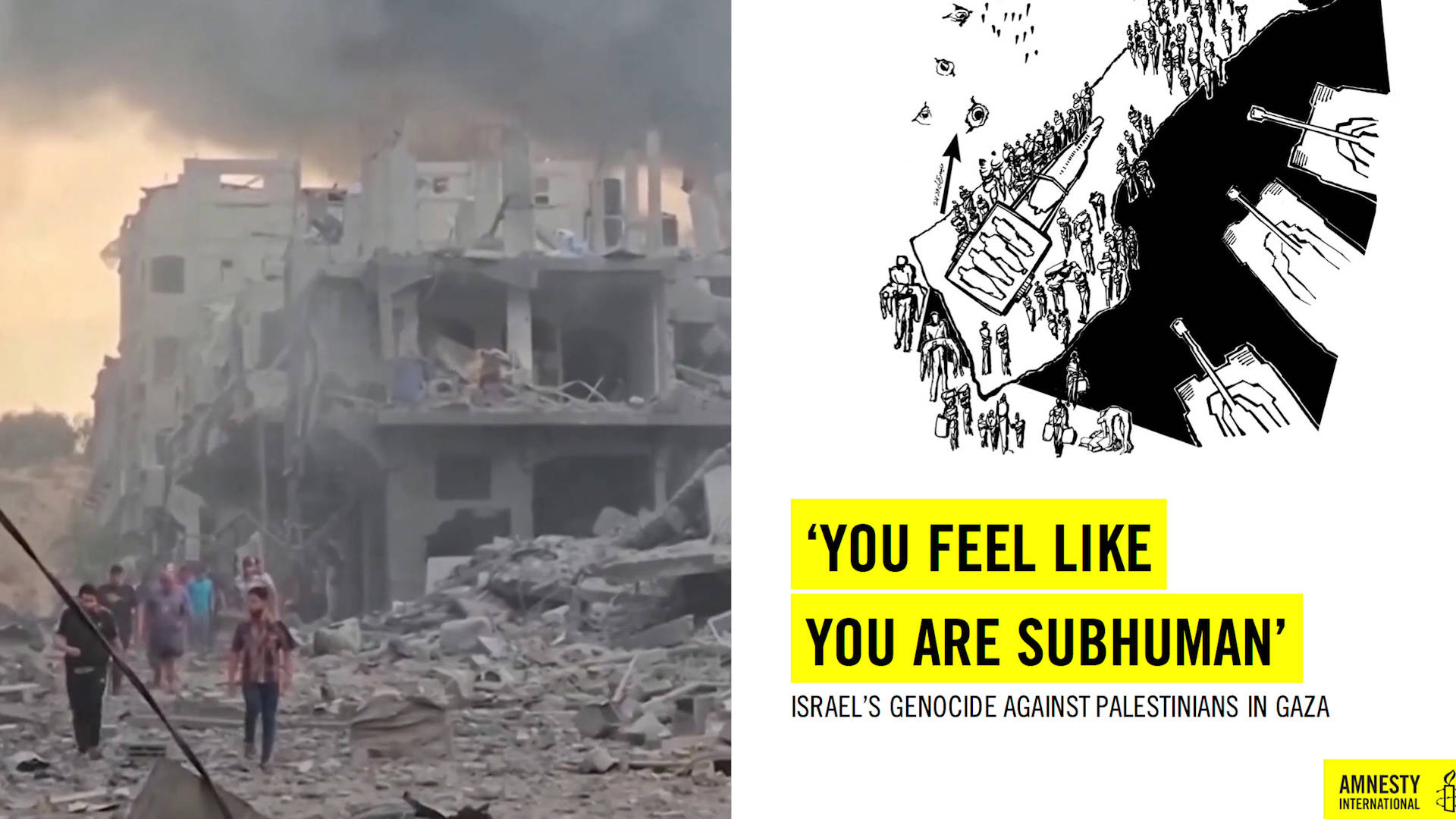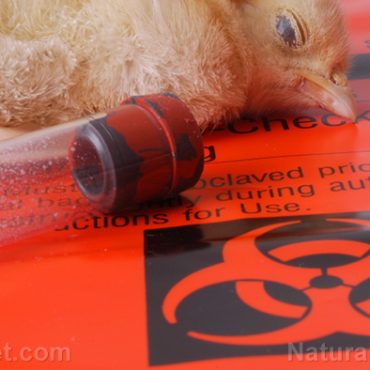This is a rush transcript. Copy may not be in its final form.
AMY GOODMAN: In a landmark report released Thursday, Amnesty International has accused Israel of committing genocide against Palestinians in Gaza. It’s the first time a major human rights organization has labeled Israel’s actions in Gaza following the October 7th attacks of 2023 as genocide.
This is a video released by Amnesty International to accompany its new report. “’You Feel Like You Are Subhuman’: Israel’s Genocide Against Palestinians in Gaza” is the name of this video. It features Amnesty International Secretary General Agnès Callamard and their Israel-Palestine researcher, Budour Hassan. It begins with a clip of former Israeli Defense Minister Yoav Gallant.
YOAV GALLANT: [translated] We are laying a complete siege on Gaza — no electricity, no food, no water, no fuel. Everything is closed. We are fighting human animals, and we act accordingly.
AGNÈS CALLAMARD: For over a year, we’ve witnessed utter carnage unfolding right before our eyes in the occupied Gaza Strip, with no end in sight. Many have described this carnage as the first live-streamed genocide, day after day. What has your government done to prevent this genocide? What have your political leaders done? What are they doing now?
ON-SCREEN TEXT: “’You Feel Like You Are Subhuman’: Israel’s Genocide Against Palestinians in Gaza.”
NARRATOR: Israel has been waging an ongoing and devastating offensive on the occupied Gaza Strip. More than 43,000 Palestinians have been killed and tens of thousands injured, nearly 2 million displaced, neighborhoods flattened, aid and lifesaving supplies restricted — all sparking an unprecedented humanitarian catastrophe.
The term “genocide” has increasingly been used to describe Israel’s conduct in Gaza. But how can we assess whether what is happening is actually genocide? The first treaty to explicitly define and criminalize genocide in international law was adopted by the United Nations in 1948 in response to the atrocities of World War II. To prove genocide has taken place, you need to show that one or more acts prohibited by the Genocide Convention was carried out and that it was “committed with the intent to destroy, in whole or in part, a national, ethnical, racial or religious group” — in this case, Palestinians.
BUDOUR HASSAN: As part of Amnesty International’s research, we have documented Israel’s perpetration of three out of the five prohibited acts under the Genocide Convention since the 7th of October. These include killing members of the group, causing them serious mental or bodily harm and inflicting conditions of life calculated to bring about their physical destruction. For example, this would include the destruction of essential infrastructure, including homes, agricultural land, water and sanitation infrastructure and infrastructure indispensable to the civilian population. They also include the mass repeated displacement under inhumane and unsanitary conditions. And they also include the deliberate obstruction of entry of lifesaving supplies and aid.
NARRATOR: It is clear the Israel authorities have deliberately inflicted these conditions and knew they would inevitably result in a deadly mix of hunger and disease, which brings us to the other important component of the crime: the intent to destroy.
ISRAELI SOLDIER: [translated] Three, two, one.
PRESIDENT ISAAC HERZOG: It’s an entire nation out there that is responsible. It’s not true, this rhetoric about civilians not were — were not aware, not informed. It’s absolutely not true.
BUDOUR HASSAN: The racist, dehumanizing and genocidal statements call for the annihilation of Palestinians in Gaza and making Gaza unlivable. They provide evidence for Israel’s intent to physically destroy Palestinians. As part of Amnesty International’s research, we reviewed over 100 statements made by Israeli officials, and these statements clearly were echoed by Israeli soldiers on the ground.
BRIG. GEN. YOGEV BAR SHESHET: [translated] Whoever returns here, if they return here after, will find scorched earth — no houses, no agriculture, nothing. They have no future.
NARRATOR: Specific genocidal intent should be assessed through analyzing the most recent conflict, while taking into account a system of apartheid, a brutal occupation and the 17-year unlawful blockade of Gaza — a history of systematic human right violations built on the continuous dehumanization of Palestinians.
BUDOUR HASSAN: We have documented an unprecedented scale, speed and seriousness of inhumane acts in Gaza. Palestinians are facing overwhelming trauma and pain. We have interviewed parents digging up the remains of their children with their own hands. And we have documented the mixture of hunger and disease that has ravaged Gaza, all while the healthcare sector has collapsed completely.
AGNÈS CALLAMARD: This must stop. And for genocide to end, governments around the world must come together, and they must take action, resolute action. You must ask that they stop transferring weapons that are murdering children in their thousands and decimating entire Palestinian families. You must demand that justice be delivered, that all those responsible for the genocide be held to account. Perpetrators benefit from the inaction and the complicity of too many of our political leaders. No war criminals should ever be allowed to walk free, undisturbed, fearless. Let’s put all our instruments into action — national tribunals, universal jurisdiction, International Criminal Court. Governments must do everything in their power to end Israel’s genocide.
AMY GOODMAN: That’s Amnesty International Secretary General Agnès Callamard, part of a video Amnesty released along with its 296-page report detailing Israel’s genocidal actions in Gaza.
Israel has rejected the charge of genocide, describing the report as, quote, “fabricated” and “based on lies.” This is Israeli Deputy Minister of Foreign Affairs Sharren Haskel.
SHARREN HASKEL: Amnesty International thinks that you’re stupid, because they think that in the 101 pages report that they actually produce, you will not read them. In this report, they actually altered and changed the legal terms and definition for what is a genocide, because Israel doesn’t meet those criterias. So Amnesty International had to alter it.
AMY GOODMAN: The U.S. State Department also said they, quote, “disagree” with Amnesty’s report and continue to find allegations of genocide “unfounded.”
For more on the report, we’re joined by Amnesty International researcher on Israel and the Occupied Palestinian Territories, Budour Hassan. She’s joining us from Ramallah in the occupied West Bank.
Budour, we saw you in this video report. If you can respond to what the Israeli government and the U.S. said, and tell us more about why Amnesty has taken this position, the first among international major human rights organizations, that Israel is committing genocide in Gaza?
BUDOUR HASSAN: Thank you for having me again, Amy.
Actually, if anything, the question that should be asked: Why did it take Amnesty this long to produce this report? Not why we have adopted this approach in the first place. And one answer to that is, if anything, we tried to be absolutely true to the definition of “genocide” under the Genocide Convention, but also to follow suit with the jurisprudence on genocide, including the main decisions taken by the International Court of Justice on what is genocide. And because we are talking about strict and narrow definitions, our report, and those who can read the legal section — and apparently the Israeli spokesperson failed to read that — will see that we absolutely adopt the definitions and the jurisprudence taken by the International Court of Justice, especially on the interpretation of what is specific intent.
And, in fact, this is why also it took us so long to produce this report, because we wanted to produce something that can be used by those who want to charge Israel with genocide. We wanted to produce strong enough evidence both for the commission of the prohibited acts under the Genocide Convention — in this case, killing Palestinians deliberately, inflicting them life-changing injuries, and inflicting upon them also conditions, destructive conditions, of life that would cause their slow death.
And we found that when we analyzed this conduct — and we based our analysis both on evidence collected on the ground through our fieldworkers, who have been working tirelessly on the ground in Gaza since the 7th of October, and also on the analysis of satellite imagery, on the analysis of all publicly available evidence that we could reach — we found that these prohibited acts were indeed committed.
And the next question was whether these acts were committed intentionally and with the specific intent to destroy Palestinians as a protected group or as such. And then we again followed the jurisprudence of the International Court of Justice, which is how you infer specific intent. You do infer it through two types of evidence. You do look at the pattern of conduct that the Israeli military has been adopting, which include the scale, severity and seriousness of attacks, the repetition of the attacks, the cumulative effects of these attacks, the totality of evidence that you can find on the ground. And secondly, you also look at the direct evidence, which is the statements that we heard from Israeli officials.
At Amnesty, we looked at more than 100 statements issued by Israeli officials, including 22 statements issued by high-ranking Israeli officials and military officers responsible for the war and security cabinets and responsible what is happening on the ground. We then looked at how these dehumanizing, derogatory and racist statements that called specifically for the destruction and annihilation of Gaza, for equating Palestinians in Gaza, all of them, to Hamas, and for calling for the large-scale destruction of life in Gaza — we saw how these statements were echoed by Israeli soldiers. We verified 62 videos in which soldiers appear to be echoing these statements while celebrating the destruction of Palestinian universities, mosques and agricultural lands.
AMY GOODMAN: I wanted to go directly to the U.S. State Department, who — they have said they disagree with the conclusions of Amnesty’s report. This is an exchange between reporters Prem Thakker and Said Arikat in the State Department press briefing with State Department spokesperson Vedant Patel.
VEDANT PATEL: What I can say, as a spokesperson of the U.S. government and as a spokesperson of this administration, is that the findings of — the accusations of genocide, we continue to believe those to be unfounded. … to provide as it relates to that.
SAID ARIKAT: So, if you’ll indulge me just a little bit.
VEDANT PATEL: Sure.
SAID ARIKAT: I mean, look, we have seen almost 2 million people being forcibly moved from one place to another. This morning — this morning — al-Mawasi was bombed, an area that Israel designated as safe haven for people to go to. They bombed it. They killed 20 people. What does it take? Does it have — do the whole population of Gaza have to be annihilated for you to term it genocide? What are we waiting for on this issue, Vedant?
VEDANT PATEL: Said, I’m just not going to get into —
SAID ARIKAT: Oh, sure. Fine.
VEDANT PATEL: — this rhetorical hypothetical.
PREM THAKKER: So, we’ve seen the targeting of thousands of journalists, medical staff, humanitarian workers, infrastructure workers; the total decimation of agriculture, religious sites, homes, residential blocks; the destruction of neighborhoods, memories, bloodlines. Northern Gaza is ethnically cleansed to a great extent. Doctors, including from America, say that they’ve seen kids deliberately sniped. How many acts of genocide does it take to make a genocide?
VEDANT PATEL: So, look, I am just — I appreciate what you’re trying to do with the way that you phrased that question, but let me just say again unequivocally that the allegations of genocide, we find to be unfounded.
AMY GOODMAN: So, that’s the State Department spokesperson Vedant Patel responding to journalists Prem Thakker of Zeteo and Said Arikat of Al-Quds. If you can respond, Budour Hassan, as you sit there in the occupied West Bank, as you sit there in Ramallah, having just been a major part of producing this report of Amnesty International?
BUDOUR HASSAN: One question that was addressed was how long would it take for the United States to acknowledge the severity of what’s happening in Gaza. The United States administration is not only denying that a genocide is happening in Gaza, it’s denying that human rights violations are being committed by the Israeli authorities in Gaza.
And we know, Amy, probably in four or five years’ time, those very same people who are now denying that a genocide is happening, once they become retired officials, they will say, “It happened under our watch, and we did nothing to stop it.” And they will probably give speeches in which they are awarded money in order to come and say, “We knew that this was happening. We could not stop it.” And unfortunately, this has been happening so often.
And this is — if anything, it’s a damning indictment of the United States’ failure to stop Israel’s violation. If there is any country that has the capacity, the power and the tool to stop this genocide, it’s the United States. Not only has the United States failed to do so, it has consistently awarded Israel. It has consistently continued to flout the United States’ own laws in order to continue giving Israel the weapons — the very same weapons that are used by Israel to commit the genocide in Gaza.
AMY GOODMAN: You know, this reminds me of 30 years ago almost exactly, when Madeleine Albright was secretary of state and Bill Clinton was president, and they were continually challenged about what was happening in Rwanda. And they refused to use that term “genocide,” because if they did — well, can you talk about what it would mean, what it would trigger, if they used the word “genocide”? And by the way, in that case, they would later apologize and say they were wrong.
BUDOUR HASSAN: But what would these apologies — how would these victims read the apologies?
AMY GOODMAN: Right. Forget the apology. Talk about —
BUDOUR HASSAN: And I think it’s not only the guilt of —
AMY GOODMAN: Forget the apology. Talk about what it would mean if they use the word “genocide.” What does that trigger internationally, in terms of the world bodies, at the U.N., and the response?
BUDOUR HASSAN: Obviously, considering that genocide is a crime under the ICC statute, and considering that we’re talking about something that is absolutely prohibited — genocide is never justifiable, not even in an armed conflict, which means that those who continue to arm Israel while it is committing genocide are guilty of being complicit. And complicity in genocide is also prohibited under the Genocide Convention. So, the States, part of why they are denying not only that genocide is being committed, but that war crimes and possibly crimes against humanity are also being committed, is that they don’t want to risk being accused of complicity in these crimes.
AMY GOODMAN: Finally, Budour, you are in Ramallah. You’re in the occupied West Bank. If you can talk about what’s happening in the West Bank right now, with members of the war cabinet talking about wanting to annex the whole area? What is actually happening on the ground?
BUDOUR HASSAN: Not to deflect the question, Amy, but just because this report that we worked on was not just addressed to the international community or the court, it was mainly addressed to the victims, I would just ask you to give me just a couple of seconds really just to talk about the victims.
We interviewed 212 people in Gaza, including victims of airstrikes. People who lost their entire families agreed to speak to us to share their experiences, their grief. We went back to interview some of those we interviewed way back in October and November. We went back to interview them in October this year to tell them about the report. And we saw how even a year — after a year had passed since they lost the entirety of their families, the scars of their loss never left them. One of the parents whom we interviewed again told us, “I don’t want people’s sympathy. I want my children back.” And we know that no one can really bring his children back, but he also added that “At least what we can do and what I want you to do is to fight as hell for me to get the justice that my children deserve.” This is a parent who lost his wife, all of his three children, his sister and his parents. And these stories happened all over again.
We also talked to people who face daily humiliation while they are waiting on queues for bread, for clean water for hours upon hours, people who were displaced repeatedly. Some were displaced for 12 times. And if anything, why these people would agree to talk to you is because they are waiting for justice, is because they believe that at least it is our duty to bear witness to the ongoing carnage and to name it for what it is: genocide.
Now, concerning what’s happening in the West Bank, I think all the attempts of Israel is to annex more and more land from the West Bank, including through military orders, including through designating land in the West Bank as state land. It’s part of Israel’s onslaught, and full-throttled onslaught, on Palestinian existence, on this land, on Palestinian memory, on Palestinian presence. This fight, this onslaught, takes many shapes, many forms. In Gaza, we see it in the form of genocide. In the West Bank, we see it in the form of slow but really clear dispossession and mass displacement. More than 300 households have been displaced in the West Bank since the 7th of October, 2023. But what is common between these — among this architecture of dispossession, displacement, dehumanization, be it in the West Bank, including East Jerusalem, or the Gaza Strip, is Israel’s ongoing attempt, with the support of the United States, to erase Palestinians from this land.
AMY GOODMAN: Budour Hassan, I want to thank you so much for being with us and also comment that today is the anniversary of the death of Refaat Alareer. He was killed one year ago today in an Israeli strike. His last tweet, “The Democratic Party and Biden are responsible for the Gaza genocide perpetrated by Israel.” Refaat Alareer is known around the world. He was a professor at Islamic University and an award-winning poet. Budour Hassan, thank you so much for being with us, Amnesty International researcher on Israel and the Occupied Palestinian Territories. We will link to Amnesty’s report, which has just concluded Israel is committing genocide against the Palestinians in Gaza. The report is called “’You Feel Like You Are Subhuman’: Israel’s Genocide Against Palestinians in Gaza.”
Next up, All That Remains, a new Al Jazeera documentary, follows a 13-year-old girl named Leyan from Gaza who lost her leg in an Israeli attack. She is now in Philadelphia, one of a thousand child amputees in just the first two months of the Israeli attack on Gaza. Stay with us.











Post comments (0)